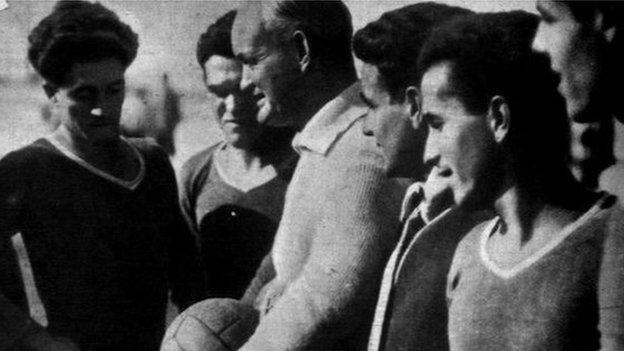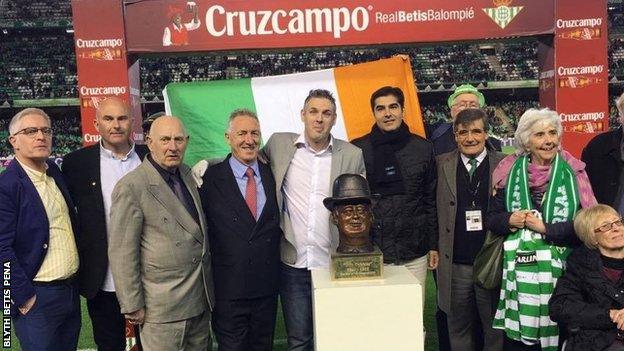El Gran Derbi, 'Don Patricio' and why Blyth Spartans fans remembered a Real Betis great
- Published

Patrick O'Connell with the Real Betis team he led to the Spanish championship in 1935
The Northumbrian coast is not the place you expect to find an outpost of Beticos, but on Sunday a band of Blyth Spartans fans will don the green and white stripes sported by both their favoured clubs to support Real Betis in their derby against Sevilla.
It is a tale that has roots in Dublin, Seville and Blyth, spans most of a century and centres around an Irishman who captained Manchester United, won Real Betis their only La Liga title and was heralded as the saviour of Barcelona.
An appreciation of club colours was the initial attraction for those who formed the Blyth Betis Pena, but they now have hundreds of followers and will congregate in Newcastle to watch the game as part of an event organised by La Liga.
However it is a fan group that has done more than just support from afar, etching their own page in Betis history by preserving the legacy of the club's most successful but oft-forgotten coach.
When the Blyth Betis Pena learned of Patrick O'Connell's story, and that he was buried in a pauper's grave in London, they set about raising money to provide a proper headstone and help provide a more fitting final resting place.
It was a campaign that garnered support from players such as Johan Cruyff, Oliver Kahn, Martin O'Neill, Franz Beckenbauer and Luis Figo, and ended with the group presenting a bust of the Irishman to the club in front of 37,000 fans on the pitch at Real Betis' Benito Villamarin Stadium.
"We couldn't believe it, nobody knew where he was for 30 years," Simon Needham, secretary of the Blyth Betis Pena, told BBC Sport.
"A gentleman who captained Manchester United and Ireland, took Real Betis to the championship and managed Barcelona during the [Spanish] Civil War, ended up a pauper in London and was buried in an unmarked grave."
Who was 'Don Patricio'?
The legendary Dublin-born O'Connell has a foot in both camps of 'El Gran Derbi', having managed Betis and Sevilla, though it was with the former he is most highly regarded.
He also boasts a fascinating story, one that was made into a film called 'Don Patricio' off the back of the Blyth Betis Pena's work.
As a player, O'Connell was involved in Manchester United's controversial 2-0 victory against Liverpool at Anfield in 1915 that saw them avoid relegation, but later resulted in seven players being handed life bans for match-fixing by the Football Association.
O'Connell was not among those punished - although he did miss a penalty in the game - but a playing career that included spells at Sheffield Wednesday and Hull City, began to peter out as war gripped the world.
That finally ended 100 years ago as player-coach of Ashington - a short drive north from those Blyth fans who sought to remember him - and where he took his first managerial steps.
O'Connell then turned up in Spain later that year, having left his family behind in the UK, as manager of Racing Santander.
It was the beginning of a journey in Spanish football that would lead to O'Connell guiding Real Betis to the club's only La Liga title in 1935.
The Irishman, who played six times for his country, was praised for the professionalism, fitness and tactical ideas he brought to the club, complemented by his charismatic nature. Barcelona soon sought the services of 'Don Patricio'.

The Blyth Betis Pena present a bust of Patrick O'Connell to Real Betis
Shortly after the Irishman swapped Seville for Catalonia the league was suspended in 1936 when civil war broke out and Barcelona president Josep Sunyol killed by Francoist soldiers.
Barcelona continued playing regional football and, as the club's economic situation worsened, O'Connell led them on a four-month money-making tour of Mexico and New York on the invite of a Catalan businessman who had emigrated to Mexico.
It was a huge success and the club cleared their debts, which is where the story of how he saved Barcelona from bankruptcy stems from.
He is regarded highly by the Catalan club for sticking with them during the civil war years, later rejoining Real Betis and also managing rivals Sevilla, finishing second in La Liga in 1942-43.
O'Connell returned to London, where he died of pneumonia in 1959 at the age of 71.
"Patrick O'Connell was a forgotten person in world football and we put his name back," said Needham. "We are very proud of that, it all started in the clubhouse at Blyth Spartans.
"Real Betis have been 100% behind it. Patrick is part of their history and they realise that, he won them their highest honour in the game."

The Fast and the Farmer-ish: Who will prove victorious and take home the tractor trophy?
Built on fakery: Every brand has a story, even the ones that don't exist...
